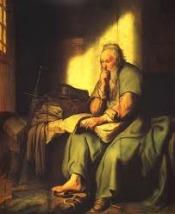 Birthing, Developing & Establishing
Birthing, Developing & Establishing
Some segments of the Church believe that Apostles are basically evangelists sent abroad to establish new churches, aka. missionaries. Paul went through Asia Minor using each of the five fold gifts to establish churches, then developed those passions in God’s people, establishing them so that he could leave and do the process elsewhere. He made return trips or wrote letters to “see over”, not “oversee” what had been planted, watered, and now harvested.
Paul entered a town first visiting the synagogue to proclaim the gospel to the Jew, God’s chosen. After their rejection, he would take the gospel to the Gentiles who would receive the good news of Jesus Christ. Paul’s teaching skills often kicked in when talking to Jews in the synagogue or Greeks on Mars Hill. His pastoral/shepherding skills would help the new believer to walk out this new found faith in their daily lives, breaking break together, praying with one another, etc. His prophetic skills would direct his path, telling him where to go and when, as well as manifesting miracles. He needed all four of these skills to “birth” a church, and usually brought another brother with him on his journey who also had talents, passions, and points of view to share. With the church birthed, developed, and established, although still in its infancy, Paul and associate would move on to another location, not stay and control, or oversee, their establish work.
Moving on, Paul, usually through letters, would “see over” the works he established, not lord or “oversee” them. He would share his opinion or point of view with these churches in his letters, but he always trusted the Holy Spirit to do the work, not himself. The Holy Spirit worked in him and would work in others believers as well!
Paul would establish churches to survive and grow on their own. He did not bring in “leaders from Jerusalem” to “run” the church in his absence. He did not bring a “Jerusalem hierarchy”, or denominational paradigm, to run and rule these new churches. The people he birthed, developed, and established were the life of the church, they remained, so he established them. Often a traveling apostle, like Apollos, or an encourager like Barnabas would return to support their efforts, but they did not stay. Each had a role, a passion, a gifting, a point of view. Paul would write, “I planted, Apollos watered.” Acknowledging different passions, gifting, and point of view brought unity, not division like in today’s Church.
Paul never established “St. Paul’s Church of said denomination”, but established a church named after the city where it was located, ie. church of Corinth, church of Ephesus, etc., each with its own personality and make up (as Revelations 2 & 3 so vividly depicts). Maybe we, the Church, need a different mindset toward a common believer who has a passion, vision, and point of view of seeing the Big Picture of the Church and encourage him to exercise them.